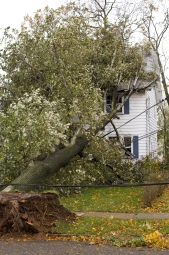 Severe weather can test even the most seasoned homeowners. And while storm hazards such as power outages, downed trees, and flooding can result in costly damage to your home, they can also put your family’s safety at risk. The key to making it through a storm safely is to be prepared.
Severe weather can test even the most seasoned homeowners. And while storm hazards such as power outages, downed trees, and flooding can result in costly damage to your home, they can also put your family’s safety at risk. The key to making it through a storm safely is to be prepared.
Protect your home
Before a storm arrives, you’ll want to take proactive steps to prevent damage to your home, such as:
- Cleaning your gutters and downspouts so that water can flow freely away from your home
- Inspecting and repairing roof shingles and flashing to prevent water damage
- Trimming overhanging tree limbs
- Securing loose objects (e.g., grills and patio furniture)
- Parking your car and storing any heavy equipment (e.g., lawnmower) inside a garage
- Investing in storm windows, doors, and shutters
Have an emergency plan/stock up on supplies
A severe storm can cause power outages that last for days. It can also result in downed power lines, fallen trees, and flooding that make roads impassable. You’ll want to have an emergency plan that identifies a place nearby where you can safely stay if you lose power for an extended period of time.
In addition, you should gather the necessary supplies you’ll need to stay safe both during and after a storm. The following are some items to put together in an emergency supply kit.
Food/supplies. Stock up on enough nonperishable food to sustain you and your family for several days. You’ll also want to store other items that are specific to your family’s needs, such as infant formula, diapers, pet food, clothing, and blankets.
First aid/medicine. Be prepared for any possible medical needs by having a first aid kit. Also talk to your doctor about obtaining an extra prescription for important medications you take such as heart and blood pressure medications, insulin, and asthma inhalers.
Communication/safety items. Make sure your cell phones and other methods of electronic communication are fully charged before the storm arrives. Also gather additional safety items, such as matches, flashlights, batteries, and an AM/FM radio.
Important documents/valuables. Place important documents, such as personal records (e.g., birth and marriage certificates), property records (e.g., insurance policies), medical records, financial information (e.g., bank or credit card information), and any valuables in a secure location that is easily accessible in case of an emergency.
Review your insurance coverage
Review all of your insurance policies (e.g., homeowners, renters, and auto) to make sure that you have appropriate coverage for your property and belongings. Your home and its contents should be insured to their full replacement cost, including any new additions, remodels, and furniture. To assist with post-storm insurance claims, be sure to take pictures/videos and make an inventory of your home and valuables in case they are damaged or destroyed.
Keep in mind that certain types of storm damage (e.g., flood and hurricane) may not be covered by a standard policy or may require you to pay a separate deductible. If you live in a high-risk storm area, you may need to purchase insurance specifically designed for floods and hurricanes. Contact your insurance agent to determine if you need to purchase additional insurance above and beyond traditional coverage.
After the storm
If your home suffers severe storm damage from a natural disaster, you may be eligible for immediate disaster relief funds and special programs through the Federal Emergency Management Agency (FEMA) and various state/local government agencies.
You’ll also need to file a claim for storm damage with your insurance company. To make the claims process easier, take pictures to document the damage — both inside and outside of your home — as soon as possible. While your claim is being processed, take steps to prevent further damage (e.g., putting a tarp on a damaged roof), since the insurance company may not cover any additional damage that occurs after the storm passes.
Keep in mind that the process for filing an insurance claim can take time, especially if your home is in an area that has been impacted by a large-scale storm. As a result, you should contact your insurer with any questions you may have regarding the claims process.
| IMPORTANT DISCLOSURES ERB FINANCIAL is an independent contractor who offers Investment Advisory Services & Securities through Excel Securities & Assoc., Inc. member FINRA, SIPC, 200 Canal View Blvd., Rochester NY 14623, 585-424-1234.Broadridge Investor Communication Solutions, Inc. does not provide investment, tax, or legal advice. The information presented here is not specific to any individual’s personal circumstances. To the extent that this material concerns tax matters, it is not intended or written to be used, and cannot be used, by a taxpayer for the purpose of avoiding penalties that may be imposed by law. Each taxpayer should seek independent advice from a tax professional based on his or her individual circumstances. These materials are provided for general information and educational purposes based upon publicly available information from sources believed to be reliable—we cannot assure the accuracy or completeness of these materials. The information in these materials may change at any time and without notice. This communication is strictly intended for individuals residing in the state(s) of NY. No offers may be made or accepted from any resident outside the specific states referenced. |
| Prepared by Broadridge Investor Communication Solutions, Inc. Copyright 2018. |


